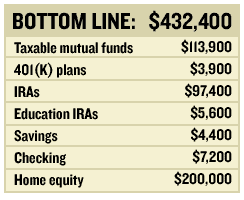
NEW YORK (CNN/Money) - Many aspiring millionaires apply discipline in their campaign to attain wealth, often forfeiting pricey, instant-gratification or big-ticket indulgences that have become a matter of course for many Americans.
Yet RJ Singh and Tara Jebens-Singh never feel that they are missing out on life's comforts and joys.
They pursue their favorite pastimes, have a nice house in a good neighborhood, take vacations, go out, and very much enjoy their time together with their two children.

For RJ, a 31-year-old software programmer whose salary is about $81,000 a year, and his (currently) stay-at-home wife, life is sweet and made sweeter by the prospects of a secure financial future. Already they've accumulated more than $430,000 in assets.
A philosophy that stresses substance over style and family values over materialism fuels their journey. "The things we buy contribute to our quality of life," says RJ. "A big house would not, nor would a fancy car. We don't buy fluff."
Instead RJ drives a 1993 Corolla with 150,000 miles on it and Tara has a 1997 Saturn with 70,000. Their house is a comfortable, but not ostentatious, three-bedroom, three-bath structure on a half-acre lot in Roseville, Minn., a leafy suburb just outside the state capital of St. Paul.
True to their roots
RJ, who grew up in Dehradun, in northern India, attributes his frugal streak to his father, who stressed living within one's means and making the most of simple pleasures. But it's actually Tara, according to RJ, who most fervently advocates for their basic life style.
"It's not that I despise materialism," says the former policy analyst for the state of Minnesota, who grew up in a small Wisconsin town, "but material things don't bring me happiness."
The couple seeks wealth not as an end itself but as a way to maximize their options. RJ says, "It's all about choice. What if someone at work asked me to do something I don't want to do? I want to have the choice to say no. And I want to be able to take summers off when the kids get older."
The couple prizes time spent with Ishan, six years old, and Rohan, four. RJ gets to work at 6:30 so he can return home by 3:30 p.m., giving him afternoon hours of quality time with the kids, often spent outside during Minnesota's long summer days.
He also gardens in the backyard, growing tomatoes, herbs, peppers, cucumbers and other veggies, less to save money than to satisfy the couple's desire for homegrown food.
The couple doesn't dine out much, partially because Tara, a vegetarian, is difficult to accommodate in many restaurants. They watch videos (from the local library) a couple of times a week, and they enjoy entertaining family and friends and playing board games together after the kids go to bed.
The modest cost of these simple pleasures have helped the couple sock away $102,000 in their retirement accounts, $10,000 in their checking and savings accounts, and accumulate $115,000 worth of mutual funds.
Combating consumerism
But what about when the kids get older and TV ads and peer pressure start to kick start their latent consumerism? Will kids clamoring for the latest in cool clothes and accessories disturb the couple's carefully crafted idyll?
RJ thinks there'll be issues but says, "If we give the kids our time and dedication, they won't need a lot of material things." He pays each child to perform age-appropriate chores and has trained them to enjoy hunting at garage sales for bargain toys and clothes.
Favorite pastimes reflect the couple's conservationist bent. Vacations are often spent camping, or seeing Tara's Wisconsin-based mom and dad, RJ's brother in Chicago, and other family. "We don't need to travel to Disney World to feel rejuvenated," says RJ.
RJ also saves money by acting as his own handyman and home contractor. In the past year or two he has redone the kitchen and a bath. He also takes on the occasional contracting job and uses the profits to pay for his own remodeling.
The rare contracting jobs he takes, an annual bonus of from 10 percent-to-20 percent of salary, plus a small amount Tara brings home teaching aerobics, brings their household income up to about $95,000. They put $18,000 a year into retirement accounts and regularly pay down on their mortgage. They refinanced their original 30-year mortgage in January, cutting the term to 15 years. They already have more than $200,000 equity in their house, which they bought seven years ago, and hope to pay it off completely in about five years. They have never carried other debt.
The couple draws contentment from knowing they place less demand on the world's resources than most Americans. They're not looking to make a big splash. Instead, says RJ, "We want to leave a small footprint on the earth."

|

